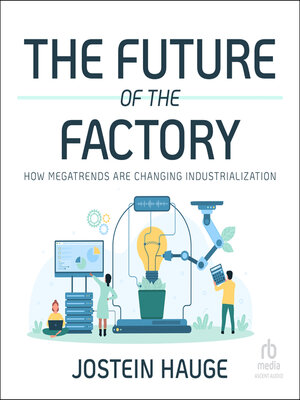The Future of the Factory
audiobook (Unabridged) ∣ How Megatrends are Changing Industrialization
By Jostein Hauge

Sign up to save your library
With an OverDrive account, you can save your favorite libraries for at-a-glance information about availability. Find out more about OverDrive accounts.
Find this title in Libby, the library reading app by OverDrive.



Search for a digital library with this title
Title found at these libraries:
| Library Name | Distance |
|---|---|
| Loading... |
For centuries, industrialization and factory-based production have been core ingredients in economic growth, development, and innovation. This symbiotic relationship between industrialization and economic prosperity is now changing. "Megatrends"—trends within the domains of technology, economy, society, and ecology that have a global impact—are changing the ability of the manufacturing sector to serve as the engine of growth, changing traditional ideas of technological progress, and changing growth and development opportunities in both the global South and the global North.
Four megatrends are particularly worthy of note: the rise of services, digital automation technologies, globalization of production, and ecological breakdown. In this book, Jostein Hauge provides a novel analysis of how these megatrends are changing industrialization, and charts new pathways for industrial policy and global governance. He also offers a wide-ranging account of the role of technology, globalization, and ecology in shaping the world economy. The Future of the Factory shows that industrialization remains a cornerstone of economic prosperity, but that power asymmetries in the world economy create uneven opportunities for achieving economic growth, development, and industrialization.
Four megatrends are particularly worthy of note: the rise of services, digital automation technologies, globalization of production, and ecological breakdown. In this book, Jostein Hauge provides a novel analysis of how these megatrends are changing industrialization, and charts new pathways for industrial policy and global governance. He also offers a wide-ranging account of the role of technology, globalization, and ecology in shaping the world economy. The Future of the Factory shows that industrialization remains a cornerstone of economic prosperity, but that power asymmetries in the world economy create uneven opportunities for achieving economic growth, development, and industrialization.







